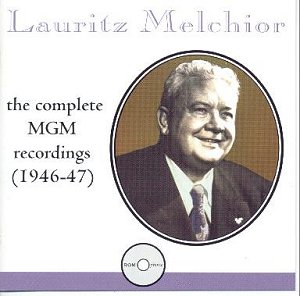Der lenz. Without a song. For you alone. Dein ist mein ganzes Herz
(Lehár). I det frie (Danish Children's Song. Agnus Dei (Bizet). Easy
to love (Porter). Stille nacht. Cantique de Noël (Adams). The rosary
(Nevin). Ave Maria (Bach-Gounod). The kiss in your eyes (Heuberger). Spring
came back to Vienna (Rotter). Kaiserwalzer (J. Strauss II). Torna a Surriento.
The song is you (Kern). Summer moon (Stravinsky. arr. Klenner). Mattinata.
Who is Sylvia? (Schubert). O promise me (from Robin Hood). I love you truly
(Bond). All mein Gedanken. Recondita armonia. E lucevan le stelle (Puccini)
Vesti la giubba. No.Pagliaccio non son! (Leoncavallo). Helan går (Swedish
Drinking Song).
Lauritz Melchior (1890-1973) the Danish singer was one of the most famous
Wagnerian Heldentenors, singing Tristan over 200 times and appearing
often as Siegfried, Lohengrin, Siegmund and Parsifal. He sang with a model
legato and a feel for the shape and direction of a phrase and an equalised
scale that was the envy of many a bel canto singer. His energy and projection
were formidable.
At the same time he had a great sense of humour and while he was in America
he began to mimic Frank Sinatra which led to some good humoured banter between
the two singers -- and to both radio stations and film studios taking an
interest in the lighter side of the Melchior talent.
In the 1930s and 1940s the Hollywood studios, particularly MGM, took a rather
inverted snobbish interest in the world of opera and would include stars
of the opera and operatic arias in otherwise light-hearted musicals (or in
films with a specific operatic orientation such as The Great Caruso)
with varying degrees of success. Thus it was that the MGM recording company
recorded, over five sessions in 1946-7, the two dozen or so numbers on this
album as an extension of Melchior's appearances in five MGM movies.
Now there is always negative comment about operatic singers taking on show
numbers. I remember Kiri Te Kanawa being criticised as too powerful and too
old for her role in the DG recording of West Side Story. I was one
of the dissenting voices. I feel the same applies here in respect of some
of the numbers - especially, Melchior's renderings of Cole Porter's 'Easy
to love' and Jerome Kern's 'The Song is You'. Melchior's voice tends to
overwhelm. This may be acceptable, on one level, in the opera house where
a certain bombast is expected in romantic arias, but it does not fit comfortably
in the context of musical comedy where a sense of intimacy is demanded for
songs like the two I have mentioned. That intimacy, in this smaller context,
is, in a sense, synonymous with sincerity -- and that seems to be drained
by the power of Melchior's voice (and his thick foreign accent). On the other
hand Melchior is much more at home in his arias from Tosca and Pagliacci
and songs from the operettas like 'The Kiss in Your Eyes' (Im chambre
séparée) from Heuberger's Der Opernball and Leoncavallo's exuberant
'Mattinata'.
The 12-page booklet has some interesting notes about Melchior's career, and
there are many photographs taken during his Hollywood years. He is shown
with Frank Sinatra, Esther Williams, Jimmy Durante and Helen Traubel.
Something of a mixed bag - probably for dedicated Melchior fans only
Ian Lace





